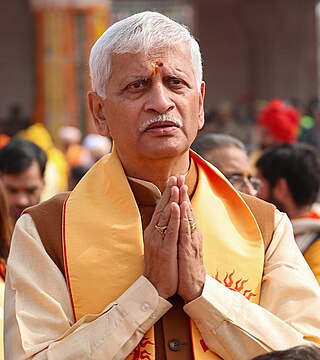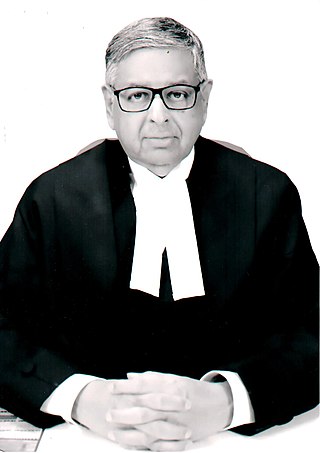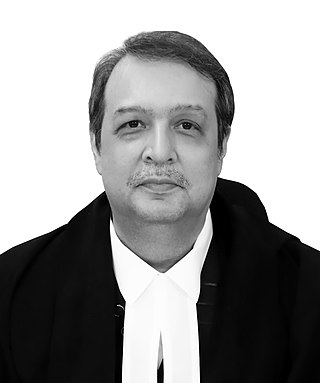
The Supreme Court of India is the supreme judicial authority and the highest court of the Republic of India. It is the final court of appeal for all civil and criminal cases in India. It also has the power of judicial review. The Supreme Court, which consists of the Chief Justice of India and a maximum of fellow 33 judges, has extensive powers in the form of original, appellate and advisory jurisdictions.

Dhananjaya Yeshwant Chandrachud is an Indian jurist, who is the 50th and current chief justice of India serving since November 2022. He was appointed a judge of the Supreme Court of India in May 2016. He has also previously served as the chief justice of the Allahabad High Court from 2013 to 2016 and as a judge of the Bombay High Court from 2000 to 2013. He is ex-officio Patron-in-Chief of the National Legal Services Authority and the de facto Chancellor of the National Law School of India University.

Jagdish Sharan Verma was an Indian jurist who served as the 27th Chief Justice of India from 25 March 1997 to 18 January 1998. He was the chairman of the National Human Rights Commission from 1999 to 2003, and chairman of the Justice Verma Committee Report on Amendments to Criminal Law after the 2012 Delhi gang rape case. He remains one of India's most highly regarded Chief Justices and eminent jurists in its history.

Naz Foundation v. Govt. of NCT of Delhi (2009) is a landmark Indian case decided by a two-judge bench of the Delhi High Court, which held that treating consensual homosexual sex between adults as a crime is a violation of fundamental rights protected by India's Constitution. The verdict resulted in the decriminalization of homosexual acts involving consenting adults throughout India. This was later overturned by the Supreme Court of India in Suresh Kumar Koushal vs. Naz Foundation, in which a 2 judge bench reinstated Section 377 of the Indian Penal Code. However, even that was overturned by a 5 judge bench in Navtej Singh Johar v. Union of India in 2018, decriminalizing homosexuality once again.
Gyan Sudha Misra is a former judge of the Supreme Court of India. Misra was elevated as a judge of the Supreme Court of India on 30 April 2010. She has passed several landmarks and notable judgments in the Supreme Court of India including judgments on conflict of interest in the Srinivasan-BCCI matter, landmark euthanasia judgment - Aruna shaunbaug matter, and the Delhi Uphaar fire tragedy dissenting judgment holding the management liable for colossal loss of human lives and directing them to pay heavy compensation to be used for social causes like building trauma centre.

Dalveer Bhandari is an Indian jurist. He is currently one of the judges of the International Court of Justice. He is a former judge of the Supreme Court of India and former chief justice of the Bombay High Court, he was also a judge of the Delhi High Court.
G.S. Singhvi is a retired judge of the Supreme Court of India. He retired on 11 December 2013.

Jagdish Singh Khehar is a former senior advocate and a former judge, who served as the 44th Chief Justice of India in 2017. Khehar is the first chief justice from the Sikh community. He has been a judge in Supreme Court of India from 13 September 2011 to 27 August 2017 upon superannuation. He served for a brief period but gave many landmark judgements such as the Triple Talaq and the Right to Privacy verdict. He was succeeded by Justice Dipak Misra.

Dipak Misra is an Indian jurist who served as the 45th Chief Justice of India from 28 August 2017 till 2 October 2018. He is also former Chief Justice of the Patna High Court and Delhi High Court. He is the nephew of Justice Ranganath Misra, who was the 21st Chief Justice from 1990 to 1991.
Arjan Kumar Sikri is an eminent jurist and a former judge of the Supreme Court of India. He was sworn in as a Supreme Court judge on 12 April 2013. Earlier, he had served as the chief justice of the Punjab and Haryana High Court. He retired as senior most puisne judge of Supreme Court of India on 6 March 2019.

Palanisamy Sathasivam is an Indian judge who served as the 40th Chief Justice of India, holding the office from 2013 to 2014. On retirement from his judicial career, Sathasivam was appointed the 21st Governor of Kerala from 5 September 2014 to 4 September 2019. Sathasivam is the second judge from Tamil Nadu to become the CJI, after M. Patanjali Sastri. He is also the first former Chief Justice of the Supreme Court to be appointed the Governor of a state. He is the first Governor of Kerala to be appointed by the Narendra Modi Government.

Uday Umesh Lalit is an Indian lawyer and former Supreme Court Judge, who served as the 49th Chief Justice of India. Previously, he has served as a judge of Supreme Court of India. Prior to his elevation as a judge, he practised as a senior counsel at the Supreme Court. Justice Lalit is one of the eleven senior counsels who have been directly elevated to the Supreme Court. He is currently ‘Distinguished Visiting Professor’ at Ashank Desai Centre for Policy Studies, Indian Institute of Technology, Bombay and Distinguished Visiting Professor at West Bengal National University of Juridical Sciences.

Syed Abdul Nazeer is the 22nd Governor of Andhra Pradesh. He is a former judge of the Supreme Court of India and a former judge of the Karnataka High Court. He was appointed the Governor of Andhra Pradesh on 12 February 2023.

Aniruddha Bose is a former judge of the Supreme Court of India. He is also the former chief justice of the Jharkhand High Court and judge of the Calcutta High Court.

Ajay Rastogi is a former judge of Supreme Court of India. He is also former chief justice of Tripura High Court and judge of Rajasthan High Court.

Krishna Murari is a former judge of the Supreme Court of India and former chief justice of the Punjab and Haryana High Court. He has also served as a judge of the Allahabad High Court till his elevation as chief justice of the Punjab and Haryana High Court.

Sanjiv Khanna is a judge of the Supreme Court of India. He is a former judge of Delhi High Court, also a position held by his father Dev Raj Khanna. Also, he is the ex officio executive chairman of National Legal Services Authority. He is in line to become the 51st Chief Justice of India.

Hima Kohli is a former judge of the Supreme Court of India from 2021 to 2024. Earlier, she served as a judge of the Delhi High Court. and then the second chief justice of the Telangana High Court, being the first woman judge to hold that office.

Bengaluru Venkataramiah Nagarathna is a judge of the Supreme Court of India. She served as a judge of the Karnataka High Court from 2008 to 2021. Her father, E. S. Venkataramiah, was Chief Justice of the Supreme Court of India in 1989.

Jamshed Burjor Pardiwala is a judge of the Supreme Court of India since May 2022. He is a former judge of the Gujarat High Court.

















